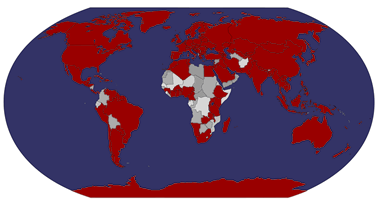This card shows the Loei Province, one of the most sparsely populated provinces of Thailand, located in the North-East of Thailand. Loei is a city surrounded by undulating mountain ranges whose summits are covered by foggy lines, abundant with various kinds of flora. The well-known ones are Phu Kradueng, Phu Luang and Phu Ruea.
The province is covered with low mountains, and the capital Loei is located in a fertile basin. The river Loei which flows through the province is a tributary of the Mekong river. This river forms the northern boundary of the province with neighboring Laos.
While temperatures in the hot season around April can be more than 40 degrees Celsius, the province is the only place in Thailand which regularly goes below 0 degrees in the nights during the cold season around December.
The provincial slogan is City of the Sea of Mountains, Coldest Place in Siam, and Beautiful Flowers of Three Seasons.
In the top left corner you can see Phra That Si Song Rak, a Buddhist stupa built in c. 1560 by Laotian and Thai kings. It is located on the Man River in Dan Sai district, Loei province of modern-day Thailand, 32 k from the modern Thailand-Laos border. The name means "Stupa of Love from the Two Nations".
I also tried to find some information about the masked characters in the top right corner. It would seem that it's from Pee Ta Khon (the Ghost Festival), a group of festivals held in Dan Sai, Loei province. The events take place over three days some time between March and July, the dates being selected annually by the town’s mediums.
The whole event is called Bun Luang. It is composed of a number of individual festivals: Pee Ta Khon, the Ghost Festival; the Rocket Festival; and Bun Pra Wate, a merit-making ceremony normally held in March.
The first day is the Ghost Festival itself; it is also called Wan Ruam (assembly day). The town’s residents invite protection from Phra U-pakut, the spirit of the Mun river. They then hold a series of games and take part in a procession wearing masks made of rice husks or coconut leaves with hats made from rice steamers, plus patchwork clothing. They also wear bells and wave wooden phalluses. The origins of this part of the festival are traditionally ascribed to a Jataka story in which the Buddha made a long journey and was presumed dead. The celebrations on his return were so raucous as to wake the dead.
The second day of the festival incorporates elements of the Rocket Festival, plus various costume and dance contests and more parades.
On the third and final day, the villagers listen to sermons.

I couldn't find any information on the stamp or even the year of issue, I just know that it shows the Sperm Whale.


 Maroon
Maroon 










































































































































































No comments:
Post a Comment